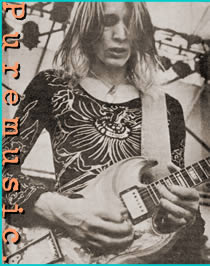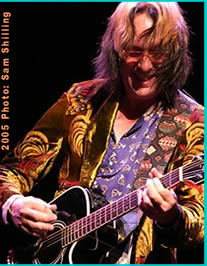 |
 |
A Conversation with Todd Rundgren (continued)
PM: A Wizard, A True Star was a big milestone in your development as a songwriter.
TR: The significant development in that particular evolution was the introduction of psychedelic drugs into the mental mix.
PM: When you were actually writing?
TR: Well, writing to me isn't sitting down at the piano with a pencil in my mouth, the typical movie-style of how songwriters write songs. I'm a terrible collaborator. I can't sit down with someone and start pulling chords out of the air and rhymes. It started just about this time. It's possible that up until the moment I started taking psychedelic drugs, I could've been a perfectly good collaborator, because I'd sit down and those chords would just start to happen.
But after that, I came to realize that what's actually in my head is far more complicated than the songs that I finally come up with, because I'm still allowing myself to be constrained by basic formulas of songwriting that I didn't come up with. Somebody else invented them and capitalized on them, and everybody else realized, "Oh, that's how you write a song." And the songs are always about your relationship [laughs], and you use the word "love" all the time, whether you're thinking about love or not. The word "love" has got to be in there. All of these things came to me, and no matter how I might be improving as a songwriter, I was improving according to somebody else's yardstick, not my own.
And that was the point where I realized also that the studio was becoming my compositional tool. It wasn't a piano. I don't sit down at the piano with a pad or something like that. What I do is I gestate musical ideas and lyrical ideas and hope that they will, sort of like DNA, match themselves up by the time we get to the end of the process. [laughs]
PM: I've read that you don't write lyrics until the very end of the recording process
TR: Right. I completely record everything before I ever get to the vocals. That's because the studio became my compositional tool. Some people, the first thing they'll do is come up with chords and melodies and figure them out on the piano. For me, I've figured them out on tape, or now, digitally. Why try to commit to memory what I'm playing on the piano when I can perform it once, then listen to it back and make changes to it if I think that the suspensions are wrong or something like that? I can continue to flesh it out until it sounds something like the final musical bed. The more I do that, the more it suggests to me melodies that belong in the song and also what the most appropriate lyric approach is for the music I'm creating.
Because, in the end, we're going to run out of either notes or words. [laughs] They're going to run out. We in the west listen to a twelve-tone scale, and in most cases, that scale is in a mode, so there are only eight notes out of that scale, all recombined in various ways. But there's all the melodies that a western ear can stand to listen to. It has to be drawn out of eight notes in a scale and put them into combinations that sound "original," but by the sheer mathematics have already been written.
And almost every topic that you could probably think of has been written about. If you want to get really obtuse and stupid, you're still going to have trouble because David Byrne wrote most of those songs about buildings and food. [laughs] It's really hard to sit down and be original and come up with something that nobody's ever heard before. So I'm always looking for ways to trigger something that is almost unexpected.
So my process has gotten almost completely reversed from everybody else's, in which they say, "Okay, this song is about this. Now I have to come up with some words that describe this. Now I have to come up with a melody and chords that go with the words." My process is completely backwards. I have a completely vague idea of the things that I'm going to write about. I figure, why do I have to come up with an actual idea first. All I have to do is just be thinking all the time, and keep an eye on what I'm thinking. And that's the subject of what I'm going to write about. The challenge for me is going to be to come up with a proper bed for ideas that are eventually going to make themselves clear to me.
In a way, it's more like sculpture than it is like typical prose. It's more subtractive than it is additive. When I start out, a song could be anything. It could sound like anything and it could be about anything. [laughs] For me, it's more a process of figuring out all the things that don't apply, and don't juxtapose, as I move along through this process. I'll say, "Maybe they'll work better in this other thing that I'm growing over here." continue
print (pdf) listen to clips puremusic home